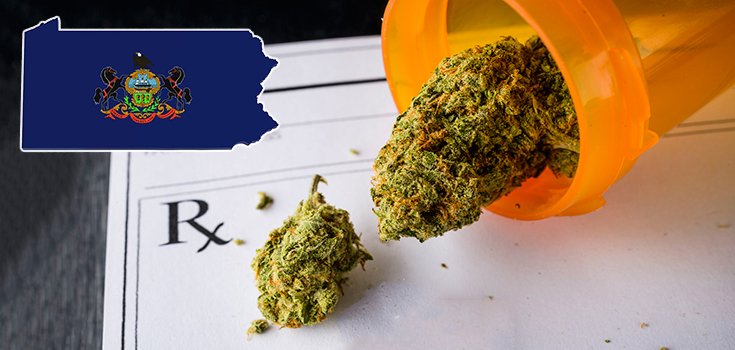Judge Halts Pennsylvania Medical Marijuana Research Pending a Review

In mid-May, Pennsylvania Gov. Tom Wolf announced that 8 Pennsylvania university institutions would lead the nation in medical cannabis research. But on May 22, a state judge issued a temporary injunction, halting the initiative for now. [1]
Under the program, each of the 8 medical schools would design research studies for cannabis companies, who would then collect data from patients using their products.
A group of 11 cannabis growers and dispensaries challenged the initiative in court, however, and now the Pennsylvania Department of Health is barred from handing out additional licenses to companies seeking to work with the selected medical schools while a legal review of the program’s regulations is conducted.
Read: Pennsylvania Becomes 24th State to Legalize Medical Marijuana
At question is the reliability of the studies, and whether it’s possible for cannabis companies to provide unbiased study results while marketing the products that would be investigated.
Commonwealth Court Judge Patricia McCullough said the initiative skirts certain regulations aimed at ensuring consistency and reliability across the board. [2]
McCullough said that “The regulations appear to be inconsistent with the legislative intent of Chapter 20, which was to permit distribution of medical marijuana for purposes of and in conjunction with research studies conducted jointly” with the medical schools. She continued to say that adding the regulations seem “to require only a minimal commitment to research” in order to be licensed.
The medical schools will keep their permits, but without marijuana companies to supply them, no research can take place, and no company has received its license yet. [1]
Read: 4 Real Stories of Cannabis’ Life-Saving Benefits
Judith Cassel, a lawyer for the firm representing 11 growers and dispensaries, said that part of the concern over the program stems from a lack of proper vetting for companies conducting research.
Marijuana companies not involved in the research initiative must obtain a grower/processor or dispensary permit to sell their cannabis products, but that is not the case for companies labeled “Clinical Registrants” under the state’s medical marijuana act. All the registrants must do is produce a contract with a medical school to launch a study.
Cassel said:
“They created these super-permits that are just big commercial entities that haven’t gone through the vetting process that are going to be automatically rubber-stamped and put into action to sell in the commercial market. It isn’t what the act intended.”
One such example is PalliaTech, a company that was eliminated in the first round of applications for grower permits in Pennsylvania in 2017, placing just 105th out of 164 applicants. Despite its low ranking, PalliaTech would still be permitted to conduct medical marijuana research.
Cassel said another of the group’s concerns is that the research could be biased, since PalliaTech and other companies would be trying to sell the same products being studied.
Researchers have their own concerns, including the quality of data that would be generated by the program.
Penn Medicine Psychology professor Marcel Bonn-Miller explained:
“It sounds like the engagement between Penn and those growers/dispensers within Pennsylvania is going to lead to research that is primarily observational in nature. That research is important but it’s also limiting, meaning what’s really needed in the field of cannabinoid research is clinical trials.”
Observational studies are generally considered less reliable than clinical trials, as they are neither randomized nor controlled. Observational trials allow companies to track the effectiveness of a product much more cheaply than clinical trials, according to Bonn-Miller, who studies the effects of cannabinoids on post-traumatic stress disorder (PTSD).
These “cheap observational studies” can allow for “quick, fast reward,” as well as bias in the data the patients report, Bonn-Miller said.
“There’s so much hype and expectation around cannabis right now that everybody thinks it’s going to work for everything. The problem is that with such high expectations you have a lot of individuals – well I’ll say it this way – you have a high placebo response.”
People who go into a cannabis study believing cannabis to be the solution to their problems are more likely to have “false-positive” results, in other words.
Johns Hopkins University Psychiatry professor Ryan Vandrey, who investigates the behavioral pharmacology of cannabis, believes that cannabis research is still in its infancy and much more must be considered before reliable cannabis studies can take place.
“There are a number of hurdles here. They’re not insurmountable but it takes a lot of time and a lot of patience and a lot of approvals to be able to do the work that we do.
At the end of the day, a lot more needs to be done in the context of cannabis research.”
However, the Health Department is considering its legal options, said spokeswoman April Hutcheson. [2]
“Research is a vital component of Pennsylvania’s medical marijuana program to improve treatment options for patients suffering from serious medical conditions, including opioid-use disorder. The research program was rolled out in consultation with the sponsors of the original legislation and our approach was meant to ensure lower costs, more accessibility and ground-breaking treatments.”
Sources:
